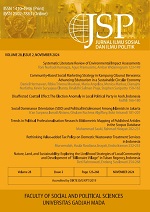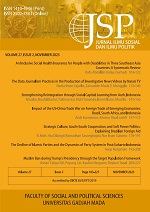Strengthening Reintegration through Social Capital: Learning from Aceh, Indonesia
Nirzalin Nirzalin(1*), Naufal Bachri(2), Fakhrurrazi Fakhrurrazi(3), Rizki Yunanda(4), Iromi Ilham(5), Muchlis Muchlis(6)
(1) Department of Anthropology and Sociology, Faculty of Social and Political Science, Universitas Malikussaleh, Indonesia
(2) Management Department, Faculty of Economics and Business, Universitas Malikussaleh, Indonesia
(3) Department of Anthropology and Sociology, Faculty of Social and Political Science, Universitas Malikussaleh, Indonesia
(4) Department of Anthropology and Sociology, Faculty of Social and Political Science, Universitas Malikussaleh, Indonesia
(5) Department of Anthropology and Sociology, Faculty of Social and Political Science, Universitas Malikussaleh, Indonesia
(6) Department of Political Science and Communication, Faculty of Social and Political Science, Universitas Malikussaleh, Indonesia
(*) Corresponding Author
Abstract
Following the conflict that prevailed from 1976 to 2005, a state of social disintegration persisted between former combatants of the Gerakan Aceh Merdeka - GAM (Free Aceh Movement) and the civil society in Aceh. This disintegration was typically fueled by the former GAM combatants’ militaristic and pragmatic mindsets, instability, and low economic well-being. Interestingly, former GAM combatants in Nisam Antara Subdistrict, North Aceh Regency, have managed to collaborate and coexist with local communities, exemplifying successful social reintegration that distinguishes them from their counterparts in other regions of Aceh. This article delves into the reality of social reintegration between former GAM combatants and the local populace, with a specific focus on the oil palm plantations managed by former GAM combatants. The study adopts a descriptive qualitative approach, and data was gathered through a combination of observations, in-depth interviews, document analyses, and focus group discussions. Key informants for this study included former GAM combatants, community and traditional leaders, plantation workers, and members of civil society. The study reveals that moral obligations within communities are guided by local wisdom, which acts as a form of social capital that fosters economic and social collaborations. Local wisdom serves as a social capital that nurtures the development of fraternity, mutual trust, cooperation, and solidarity. Moreover, it has the capacity to minimize differences and resentments, thereby promoting unity between former GAM combatants and local communities. This unity significantly contributes to the sustainability of peace in Aceh, Indonesia.
Keywords
Full Text:
PDFReferences
Aspinall, E. (2009). Combatants To Contractors: The Political Economy of Peace in Aceh. Indonesia, 87(April 2009).
Bhandari, C. (2019). Social Dialogue: A Tool of Social Reintegration and Post-Conflict Peacebuilding in Nepal. Asian Journal of Peacebuilding, 7(1). https://doi. org/10.18588/202005.00a062
Bhattacherjee, A. (2012). Social Science Research: principles, methods, and practices. In Book 3.
Bowd, R. (2008). From Combatant to Civilian: The Social Reintegration of ex-Combatants in Rwanda and Implications for Social Capital and Reconciliation PhD in Post-war Recovery Studies University of York. Post-Conflict Reconstruction and Development Unit (PRDU), Department of Politics, September.
Candelaria, J. L. (2020). Mediating civil conflicts in southeast Asia: Lessons from aceh and mindanao. Journal of ASEAN Studies, 8(2). https://doi.org/10.21512/jas.v8i2.6622
Chandler, D. (2021). “Becoming Resilient Otherwise: Decolonising Resilience Approaches Via Glissant’s Poetics of Relation”. Cambridge Review of International Affairs. https://doi.or g/10.1080/09557571.2021.1944984].
Coleman, J. (1999). Coleman, J. S. (1988). Social Capital in the Creation of Human Capital. The American Journal of Sociology, 94(1988).
Condor, S., & Gibson, S. (2007). “Everybody’s entitled to their own opinion”: Ideological dilemmas of liberal individualism and active citizenship. Journal of Community and Applied Social Psychology, 17(2). https://doi.org/10.1002/casp.885
Darmenova, Yuliya and Koo, E. (2021). “Toward Local Sustainability: Social Capital As a Community Insurance In Kazakhstan”. Journal of Eurasian Studies. Vol. 12(2),113–121. https://doi. org/10.1177/18793665211038143].
Endris, G. S., Kibwika, P., Obaa, B. B., & Hassan, J. Y. (2020). How social capital can inform targeting formal social safety net interventions in vulnerable communities in eastern Ethiopia: an ethnographic case study. Journal of International Humanitarian Action, 5(1). https://doi. org/10.1186/s41018-020-00075-3
Grayman, J. H. (2016). Official and unrecognized narratives of recovery in post conflict Aceh, Indonesia. Critical Asian Studies, 48(4). https://doi.org/10.1080/14672715.2016.1224125
Häuberer, J. (2011). The Network Approach to Social Capital–The Concept of Ronald S. Burt. In Social Capital Theory. https://doi.org/10.1007/978-3-531-92646-9_4
Hemminger, E. (2019). Bourdieu (1983): Ökonomisches Kapital, kulturelles Kapital, soziales Kapital. https://doi.org/10.1007/978-3-658-21742-6_18
Hopkins, N., & Blackwood, L. (2011). Everyday citizenship: Identity and recognition. Journal of Community and Applied Social Psychology, 21(3). https://doi.org/10.1002/ casp.1088
Kaplan, O., & Nussio, E. (2018). Community counts: The social reintegration of ex-combatants in Colombia. Conflict Management and Peace Science, 35(2). https:// doi.org/10.1177/0738894215614506
Kilroy, W., & S. A. Basini, H. (2018). Social Capital Made Explicit: The Role of Norms, Networks, and Trust in Reintegrating Ex- combatants and Peacebuilding in Liberia. International Peacekeeping, 25(3). https:// doi.org/10.1080/13533312.2018.1461564
Kim, H. Y. (2018). Effects of social capital on collective action for community dev elopment. Social Behavior and Personality, 46(6). https://doi.org/10.2224/sbp.7082
Kumsap, K., & Indanon, R. (2016). Integration of community forest management and development activities: Lessons learned from Ubon Ratchathani province. Kasetsart Journal of Social Sciences, 37(3). https://doi.org/10.1016/j.kjss.2016.08.002
Laurence, J., & Kim, H. H. soo. (2021). Individual and community social capital, mobility restrictions, and psychological distress during the COVID-19 pandemic: a multilevel analysis of a representative US survey. Social Science and Medicine, 287. https://doi. org/10.1016/j.socscimed.2021.114361
Lee, T. (2020). Political orders and peace- building: ending the Aceh conflict. Conflict, Security and Development. https://doi.org/10.1080/14678802.2019.1705071
Leff, J. (2008). The Nexus between Social Capital and Reintegration of Ex-combatants: A Case for Sierra Leone. African Journal on Conflict Resolution, 8(1). https://doi.org/10.4314/ajcr.v8i1.39419
López, M. R., Andreouli, E., & Howarth, C. (2015). From Ex-combatants to citizens: Connecting everyday citizenship and social reintegration in Colombia. Journal of Social and Political Psychology, 3(2). https://doi.org/10.5964/jspp.v3i2.388
Manan, A., Hadi, A., & Saputra, I. R. (2021). Post-conflict Reconciliation in Aceh, Indonesia: Perspectives from the Victims. Jurnal Ilmu Sosial Dan Ilmu Politik, 25(2), 162–176. https://doi.org/https://doi. org/10.22146/jsp.66177
Miall, H. (2007). Emergent conflict and peaceful change. In Emergent Conflictand Peaceful Change. https://doi.org/10.1057/9780230288492
Mpanje, D., Gibbons, P., & McDermott, R. (2018). Social capital in vulnerable urban settings: an analytical framework. Journal of International Humanitarian Action, 3(1). https://doi.org/10.1186/s41018-018-0032-9
Nafissa, I. (2020). On becoming a development cooperation partner: Kazakhstan’s foreign policy, identity, and international norms. Journal of Eurasian Studies, 11(2). https://doi.org/10.1177/1879366520943899
Nirzalin, & Febriandi, Y. (2022). Aswaja mobilization and intolerance: Sub-state ideology, religious vigilantism in Aceh, Indonesia. Cogent Social Sciences, 8(1). https://doi.org/10.1080/23311886.2022.2089382.
Okoye, E. C., Oyedum, S. O., Akosile, C. O., Onwuakagba, I. U., Ibikunle, P. O., Okonkwo, U. P., & Okeke, I. A. (2019). Cross-cultural adaptation and validation of the reintegration to normal living index into IGBO language among individuals with mobility disability. Journal of Patient-Reported Outcomes, 3(1). https://doi.org/10.1186/s41687-019-0139-9
Osborne, M., D’Exelle, B., & Verschoor, A. (2018). Truly reconciled? A dyadic analysis of post-conflict social reintegration in Northern Uganda. Journal of Peace Research, 55(1), 107–121.
Özerdem, A. (2012). A re-conceptualisation of ex-combatant reintegration: ’Social reintegration’approach. Conflict, Security and Development, 12(1). https://doi.org/10.1080/14678802.2012.667661
Patton, M. Q. (2014). Qualitative research & evaluation methods: Integrating theory and practice. Sage publications.
Pena, A. G., & Dorussen, H. (2021). The reintegration of ex-combatants and post-conflict violence. An analysis of municipal crime levels in Colombia. Conflict Management and Peace Science, 38(3), 316–337.
Petrova, I., & Korosteleva, E. (2021). Societal fragilities and resilience: The emergence of peoplehood in Belarus. Journal of Eurasian Studies, 12(2). https://doi.org/10.1177/18793665211037835
Putnam, R. D. (1994). Social Capital and Public Affairs. Bulletin of the American Academy of Arts and Sciences, 47(8). https://doi.org/10.2307/3824796
Rahman, A. (2022). Local wisdom and strengthening social integration in multiethnic society post-aceh conflict. Kasetsart Journal of Social Sciences -- Formerly Kasetsart Journal (Social Sciences), 043(3, July 2022-September 2022), 575–582. https://doi. org/doi.org/10.34044/j.kjss.2022.43.3.06
Sánchez-Arrieta, N., González, R. A., Cañabate, A., & Sabate, F. (2021). Social capital on social networking sites: A social network perspective. In Sustainability (Switzerland) (Vol. 13, Issue 9). https://doi.org/10.3390/ su13095147
Shehu, M., & Abba, A. (2020). Humanitarian crisis and sustainable development: perspectives and preferences of internally displaced persons in the northeastern Nigeria. Journal of International Humanitarian Action, 5(1). https://doi. org/10.1186/s41018-020-00084-2
Suarez, C., & Baines, E. (2022). ‘Together at the Heart’: Familial Relations and the Social Reintegration of Ex-combatants. International Peacekeeping, 29(1). https://doi.org/10.1080/13533312.2021.1952408
Subedi, D. B., & Jenkins, B. (2017). The Nexus between reintegration of ex-combatants and reconciliation in Nepal: A social capital approach. In Reconciliation in conflict-affected communities: Practices and insights from the Asia-Pacific (pp. 41–56). Springer.
Suurmond, J., Poudel, B. R., & Böhm, M. (2020). Assessing psychosocial conditions for social reintegration of former Maoist combatants and communities in Nepal. Conflict, Security and Development, 20(6). https://doi.org/10.1080/14678802.2020.1848126
Torjesen, S. (2013). Towards a theory of ex- combatant reintegration. Stability, 2(3). https://doi.org/10.5334/sta.cx
Wheatley, D., & Buglass, S. L. (2019). Social network engagement and subjective well-being: a life-course perspective. British Journal of Sociology, 70(5). https:// doi.org/10.1111/1468-4446.12644
Willems, R., & van Leeuwen, M. (2015). Reconciling reintegration: The complexity of economic and social reintegration of ex-combatants in Burundi. Disasters, 39(2). https://doi.org/10.1111/disa.12102
Wu, B. (2018). From individual social capital to collective social capital: empirical evidence from inter-firm financing trust network. Journal of Chinese Sociology, 5(1). https://doi.org/10.1186/s40711-018-0088-3
Article Metrics
Refbacks
- There are currently no refbacks.
Copyright (c) 2023 Jurnal Ilmu Sosial dan Ilmu Politik

This work is licensed under a Creative Commons Attribution-ShareAlike 4.0 International License.























